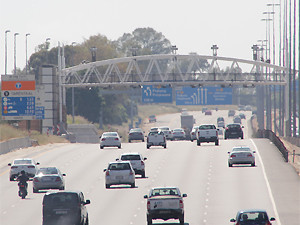
Budget 2015: Government is set to take a balanced approach to e-tolling, although any financial relief for Gauteng motorists will only come through in October's adjusted budget.
In this afternoon's budget presentation to Parliament, finance minister Nhlanhla Nene said not all infrastructure spend qualifies for budget funding, and - as such - there will be a "carefully balanced" approach to resolving the Gauteng freeway financing "matter". He noted concerns over e-tolling's socio-economic impact have been heard.
Government will shortly propose revised monthly ceilings, currently at R450 for those with e-tags, and the October mini budget will include a national contribution to meeting "associated" costs, said Nene.
Nene added measures will be taken to "ease compliance and improve enforcement", but did not elaborate on what these may be. "Cost recovery from road-users will continue to be the principal financing mechanism for this major road system."
No outcome, yet
The budget speech follows Gauteng premier David Makhura's comments in the Gauteng Provincial Legislature on Monday that a final decision on a "new dispensation" for e-tolling will be announced once an intergovernmental task team, led by deputy president Cyril Ramaphosa, has finalised its work.
This task team is dealing with the outcomes of a report prepared by a panel under Makhura's auspices, which looked into the social and economic effects of open tolling on Gauteng's freeways.
Among the panel's findings was that a hybrid funding model be introduced, which would require contributions from national and provincial government to "ease the financial burden on motorists". The panel noted a general acceptance of the user pays principle, but found the system in its current form is "inequitable and places a disproportionate burden on low and middle income households. It is also administratively too cumbersome."
Ramaphosa's team is tasked with developing a "better dispensation which will mitigate the negative impact of the e-tolls on the people of Gauteng, especially the middle and lower income groups," said the premier. Makhura expressed his confidence that the final outcome would "provide major financial relief to motorists, while simplifying the payment system to make it easy for road users to pay".
The Opposition to Urban Tolling Alliance (Outa) has welcomed Makhura's "sincere desire to see an amicable solution to the e-toll impasse", but reiterated the system is unworkable as it is not constitutional.
"In Outa's opinion, nothing but a decision to mothball the e-toll decision will heal the rift of trust between Sanral [the South African National Roads Agency] and citizens."